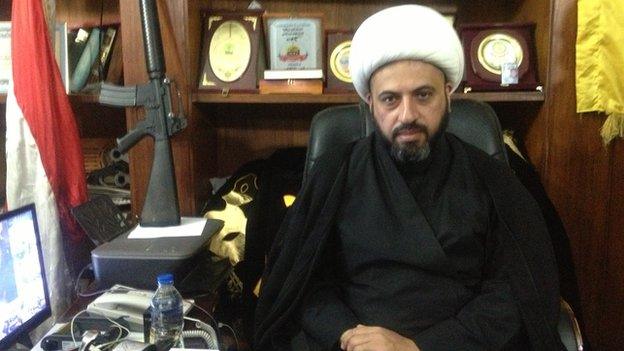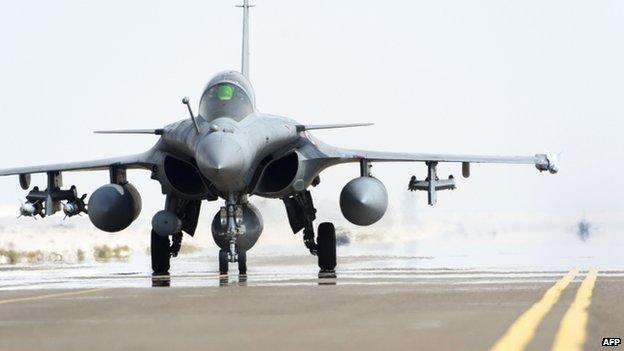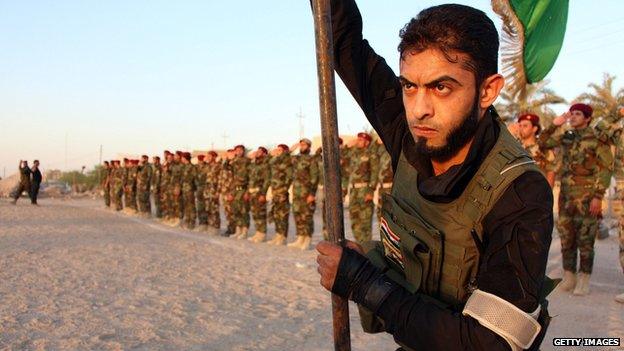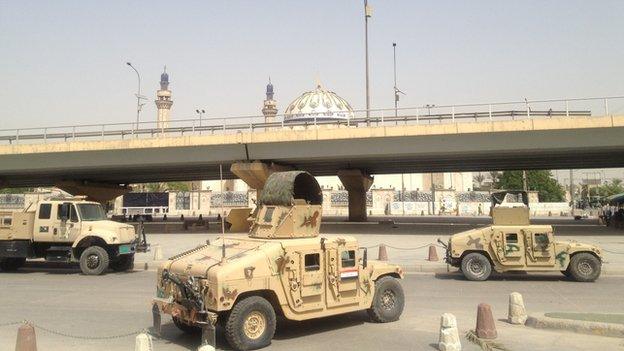Political temperature rises in Baghdad amid IS threat
- Published
The BBC's Lyse Doucet meets a powerful Shia militia taking on IS in Iraq
The last time I came to Baghdad, it was its hottest day on record - a blistering 51C in August 2011.
The political temperature was a scorcher too. I flew into the Iraqi capital with then US Joint Chiefs of Staff Admiral Michael Mullen, who was making his last trip to try to convince Iraq's leaders to keep some American troops on the ground.
All the troops went home.
Three years on, American warplanes are back in the skies above Iraq, and British jets are joining Iraq's new US-led coalition to tackle the major threat posed by fighters from the Islamic State militant group.
And Iraq's politics haven't lost their heat either.
Lightning advance
"We don't need an American dog to fight a Daesh cat," the white-turbaned, black-robed Sheikh Aws al-Kafaji tells me with a sarcastic grin.
The leader of the Al-Abbas Brigade, one of Iraq's powerful Shia militias, recently launched a recruitment drive to enlist Shias, as well as Sunnis, to take on IS fighters they call by their more derogatory Arabic title.
"The solution is to give support to the Islamic resistance and open the skies to Iraqi air strikes and make the army work with the resistance," the sheikh explains as he sits, flanked by bodyguards, in front of shelves lined with books, bullet casings and a gun.

"We don't need an American dog to fight a Daesh [Islamic State] cat" - Sheikh Aws al-Kafaji
"We will fight and finish them as we did the American invasion when we made them withdraw in shame," he insists confidently.
And yet, the lightning advance by IS fighters in June set alarm bells ringing in Baghdad and many other capitals near and far.
Despite six weeks of US led air strikes as well as bombardment by Iraqi forces, IS still holds on to a quarter of Iraqi territory.
'Existential threat'
"This must not become a political football inside Iraq between those who want international support and those who don't," insists MP Ahmed Chalabi, the controversial politician who played a key role in providing the discredited intelligence behind the 2003 US-led invasion of Iraq.
Now he's back in the political fray, tipped as a possible interior minister in Iraq's still embryonic "inclusive" government that's regarded as a sine qua non for success on the battlefield.
"It is no longer a matter of luxury. The Iraqi state is facing, for the first time, an existential threat," he tells me in his elegant Baghdad residence.
"The government must do a better job convincing everyone in Iraq that international support is required."

Some 40 countries, including several from the Middle East, have joined the US-led coalition against IS
Similar sentiments are expressed by another prominent Iraqi MP who played a key role advising Western militaries after Saddam Hussein was toppled.
"We would love the international alliance to support Iraq but on our own conditions," asserts Mowaffaq al-Rubaie.
"We need air strikes to loosen the targets, we need intelligence sharing, capacity building, delivery of weapons, but we don't need boots on the ground."
"Occupation forces have left through the door," he points out, adding, "we don't want them to come back through the window".
Defence or power play?
Black-shirted young men belonging to the newly formed Saraya al-Salaam or "Peace Brigades" of radical cleric Moqtada al-Sadr, manned their own informal checkpoints on a Shia holy day last week as tens of thousands of pilgrims made their way to the Kadhimiya shrine under heavy security.
The new brigade was ostensibly established to defend Shia holy sites from the Islamic State fighters but many suspect another power play by the mercurial firebrand cleric and his feared Mehdi Army.
"We are ready to defend dear Iraq without the occupiers," Sheikh Ali insists to me before he and a gaggle of young men standing under a flyover to escape the midday heat break into religious chanting.

The Mehdi Army has fought Islamic State fighters across the country
There's no doubting their fervour, but the fight is another matter.
Local residents in the Kadhimiya suburb say 15-20 mortars landed in the neighbourhood over the past week, and a massive car bomb exploded at a checkpoint controlled by Iraqi security forces.
I ask one of the many soldiers also on the streets that day about Islamic State fighters. He draws a circle in the air with his hand to indicate they are all around Baghdad.
"They are 26 kilometres from where we are sitting," Ahmed Chalabi later tells me in his house in a Kadhimiya neighbourhood.
Defeating Islamic State fighters across Iraq will take both military and political battles.
On the military front, Iraq needs a much better equipped, trained and motivated army.
Second Awakening
On the political front, the new government still needs to win over influential Sunni tribal leaders who were angered and alienated by the sectarian approach of former Prime Minister Nouri al-Maliki.
The tribes played an essential role seven years ago in what was called the "Sawa" or "Awakening" campaign against al-Qaeda forces when US forces were on the ground in large numbers.
"We need a second Awakening which is a surge of ideas, not just a surge of troops," al Rubaie says.
But there is no consensus on what ideas can save Iraq now.

Informal checkpoints have been set up across Baghdad in fear of an attack by Islamic State fighters
A demonstration is planned this week at Baghdad's Tahrir Square in support of former Prime Minister Maliki, who was pushed aside under pressure from Washington, among others, in moves eventually supported by his main ally, Iran.
Protest organisers accuse the new prime minister, Haider al-Abadi, of failing to protect Shias.
Protests were held in the same central square last week by Moqtada al-Sadr supporters against the US-led intervention.
Tahrir or "liberation" squares across the Middle East became famous three years ago for the uprisings that were known then as the "Arab Spring".
Now, in still sweltering 36C autumn temperatures, Iraq's political temperature is hotting up.